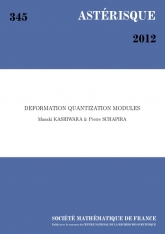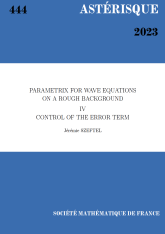
- Consulter un extrait
- Année : 2012
- Tome : 345
- Format : Électronique, Papier
- Langue de l'ouvrage :
Anglais - Class. Math. : 53D55, 35A27, 19L10, 32C38
- Nb. de pages : xi+147
- ISBN : 978-2-85629-345-4
- ISSN : 0303-1179
- DOI : 10.24033/ast.902
Sur une variété complexe $(X,\mathcal {O}_X)$, un $\mathrm {DQ}$-algebroide $\mathcal {A}_X$ est un champ d'algébroides localement équivalent au faisceau $\mathcal {O}_X[[\hbar ]]$ muni d'un star-produit et un $\mathrm {DQ}$-module est un objet de la catégorie dérivée $\operatorname {Der}^b(\mathcal {A}_X)$. Les résultats principaux sont :
- la notion de $\mathrm {DQ}$-module cohomologiquement complet qui permet de déduire diverses propriétés d'un tel module $\mathcal {M}$ des propriétés correspondantes du $\mathcal {O}_X$-module $\mathbb{Z}_X \overset{L}{\otimes}_{\mathbb {Z}_X[\hbar]}\mathcal {M}$,
- un théorème de finitude qui assure que la convolution de deux $\mathrm {DQ}$-noyaux cohérents définis sur des variétés $X_i\times X_j$ ($i=1,2,j=i+1$), vérifiant certaines hypothèses de propreté, est cohérent (un théorème de Grauert non commutatif),
- la construction du complexe dualisant pour les $\mathrm {DQ}$-modules cohérents et un théorème de dualité qui assure que la dualité commute avec la convolution (un théorème de Serre non commutatif),
- la construction de la classe de Hochschild des $\mathrm {DQ}$-modules cohérents et le théorème qui assure que la classe de Hochschild commute avec la convolution,
- dans le cas commutatif, le lien entre classes de Hochschild et classes de Chern et de Euler,
- dans le cas symplectique, la constructibilité (et la perversité) du complexe des solutions d'un $\mathrm {DQ}$-module holonome dans un autre, après localisation en $\hbar$.
Ces notes peuvent donc être considérées à la fois comme une introduction à la géométrie analytique complexe non commutative et à l'étude des systèmes microdifférentiels sur les variétés de Poisson complexes.
Déformation quantification, DQ-modules, variétés de Poisson complexes, champs d'algebroides, convolution de noyaux, complexes dualisants, homologie de Hochschild, es d'Euler, modules holonomes
Prix Papier
Prix public
46.00 €
Prix membre
32.00 €
Quantité

